Achieving True International Exchange: Making Cross-cultural Interaction Less of a One-way Street
Yoneo Ishii
Professor Emeritus, Kyoto University
Kazuo Ogura
President, the Japan Foundation
This interview was conducted in February 2010, two weeks before Professor Ishii passed away.
International cultural exchange or foreign aid does not necessarily have to be about promoting Japanese culture abroad
Ogura: In the past, people believed that international cultural exchange was in itself beneficial and rarely stopped to question its value. In recent years, however, the international community and Japanese society have both gone through tremendous changes.
Over the last few years both the world and the Japanese economy have been struggling through a recession, and we have just recently had a change in government here. The prevalent view appears to be: "Yes, cultural exchange is important, but it can wait under the circumstances." In today's interview I would like Professor Ishii to discuss what kind of role the Japan Foundation should play in this uncertain atmosphere, and to talk about new perspectives in international cultural exchange.
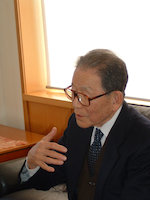 ISHII: As I mentioned before in an article I wrote for the Japan Foundation magazine Kokusai Koryu, the law that established the Japan Foundation originally envisioned an organization that would bring Japanese culture to the world. The Japanese Diet, however, passed an additional resolution to the law, incorporating the true spirit of international cultural exchange into the organization's guiding principles--namely that the Japan Foundation should work to promote mutual understanding between Japan and other countries. The law puts emphasis on the introduction of Japanese culture, but as we set out to examine the role of the Japan Foundation, it is important that we begin by contemplating the significance of that additional resolution.
ISHII: As I mentioned before in an article I wrote for the Japan Foundation magazine Kokusai Koryu, the law that established the Japan Foundation originally envisioned an organization that would bring Japanese culture to the world. The Japanese Diet, however, passed an additional resolution to the law, incorporating the true spirit of international cultural exchange into the organization's guiding principles--namely that the Japan Foundation should work to promote mutual understanding between Japan and other countries. The law puts emphasis on the introduction of Japanese culture, but as we set out to examine the role of the Japan Foundation, it is important that we begin by contemplating the significance of that additional resolution.
While there are myriad cultural exchange activities out there, most are not genuine exchange per se, but are two separate, unreciprocated activities between countries. For example, inviting a British orchestra to Japan and sending a Japanese orchestra to London would not constitute a genuine cultural exchange. It seems that that point has yet to be understood. However much globalization may have progressed, the basis of cultural exchange always comes down to the interactions of people of different, unique cultural backgrounds.
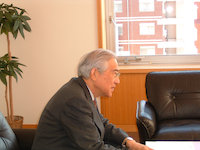 OGURA: The Japan Foundation is currently implementing initiatives that are designed to support the recipient countries' cultural development as part of peace building. These include inviting Afghan craftsmen to Japan to help revitalize the ceramics industry in Afghanistan, or providing assistance for the creation of the Balkan Chamber Orchestra, a project that aims to foster cohesion among the diverse ethnic groups in the Balkan region. Such undertakings raise the question: should there be an element representing Japan in all of our programs?
OGURA: The Japan Foundation is currently implementing initiatives that are designed to support the recipient countries' cultural development as part of peace building. These include inviting Afghan craftsmen to Japan to help revitalize the ceramics industry in Afghanistan, or providing assistance for the creation of the Balkan Chamber Orchestra, a project that aims to foster cohesion among the diverse ethnic groups in the Balkan region. Such undertakings raise the question: should there be an element representing Japan in all of our programs?
Look at Germany, for instance, which provides assistance to the Sri Lankan theater industry. The Germans give support because they believe in the value of helping others, regardless of whether the recipients' theatrical works reflect German involvement. In contrast, the Japanese tend to think that any end-result of our assistance should in some way reflect something Japanese.
ISHII: What you are referring to has nothing to do with cultural exchange; it is a strategy to promote Japan and its culture to the rest of the world. It was the Ford Foundation that laid the groundwork for the establishment of the Center for Southeast Asian Studies at Kyoto University, to which I have belonged for 25 years. In other words, an American foundation--a third party--helped us launch the Center. Any form of true cultural exchange or financial aid will not be successful unless we adopt the kind of approach that guided the work of the Ford Foundation.
In this respect the Japan Foundation's support of the Southeast Asian Studies Regional Exchange Program (SEASREP) is truly exceptional. The program is run by Southeast Asian people to develop researchers and specialists in Southeast Asia. Some may disapprove of Japan's contribution to the program because there are no Japanese involved in it, but our support is all the more meaningful precisely because the program does not serve Japanese interests.
Using the salad-bowl approach in cultural exchange activities
OGURA: Speaking of globalization, the meanings of words like "abroad" or "international" in Japanese have changed slightly in recent years, haven't they? Before, there was a clear distinction between something domestic and something foreign, and the term "international" referred to the relations between countries. Now, we no longer have to hop on an airplane to seek out international encounters; foreign people or foreign cultures are readily found within Japan. There is a sizable Brazilian community around the city of Hamamatsu in Shizuoka Prefecture, for instance. So, when we step back and rethink what international cultural exchange really is, we realize it is not just about people crossing borders but the concept should include any relations we have with our foreign neighbors living in Japan, too.
In the diplomatic world they still cling to the concept of individual nation-states, and any discussion about cultural exchange is likely to be based on the question: "what can we do to make the world understand Japanese culture?" In fact, borders are becoming obsolete and we are in an era when international exchange is not simply about introducing Japanese culture abroad. This argument, though, is hard for the general public to understand.
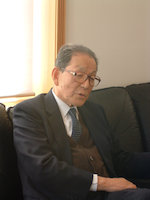 ISHII: I agree. When two cultures come into contact with one another, we can expect one of two types of consequences. Let's use fruits and vegetables as a metaphor for cultures. The first thing that happens is like tossing the fruits and vegetables together into a blender and making juice: assimilation. Let's say the children of the large Brazilian community in Hamamatsu do not speak Japanese, so you teach them our language and try to turn them into Japanese citizens. That approach is assimilation.
ISHII: I agree. When two cultures come into contact with one another, we can expect one of two types of consequences. Let's use fruits and vegetables as a metaphor for cultures. The first thing that happens is like tossing the fruits and vegetables together into a blender and making juice: assimilation. Let's say the children of the large Brazilian community in Hamamatsu do not speak Japanese, so you teach them our language and try to turn them into Japanese citizens. That approach is assimilation.
The second is a salad bowl model. Each ingredient keeps its own taste and shape, but top the salad with dressing and you have a dish with a flavor that is different from any of the individual vegetables. I am thinking how this salad bowl approach might be incorporated into international cultural exchange programs.
OGURA: We want to protect the uniqueness and diversity of individual cultures, and at the same time promote the salad bowl concept. Balancing the two is not an easy feat.
Some cultural ideals and values can only be expressed in the mother tongue
ISHII: That is why I believe bilingualism is important. By bilingualism, I mean the ability of a person to understand French or American people, for example, while retaining his/her identity as Japanese.
The problem with today's English language education for preschool children in Japan is that it is trying to turn the kids into Brits or Americans. It is essential that we first teach young children Japanese and help them build a sense of identity grounded in Japanese culture before we make them learn other languages.
There are some expressions in our language that simply cannot be translated into English. Japanese is full of onomatopoeia--buka buka, for instance, to describe shoes that are too big for one's feet, and pacchiri, which means having your eyes wide open. Things are conceived differently in English and Japanese.
OGURA: Japanese is not merely a communication tool but a cultural asset that embodies Japan's cultural traditions and values. It is not simply a matter of translating the language into English. The basic point is how to appreciate the language of each culture, and how to deeply understand it.
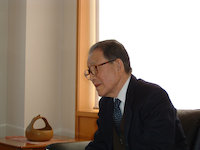 ISHII: I find it interesting that the European Union (EU) has embraced a concept called language rights. The EU's public documents are not produced in any single language, such as English, German or French; these are working languages, but EU citizens have the right to claim that any public document they receive is written in their own language.
ISHII: I find it interesting that the European Union (EU) has embraced a concept called language rights. The EU's public documents are not produced in any single language, such as English, German or French; these are working languages, but EU citizens have the right to claim that any public document they receive is written in their own language.
I would like to see the countries in East Asia joined in a true union, like the EU, in the East Asia Community. At the same time we have to remember that, no matter how close the relationships between countries become, you cannot leave out basic rights, such as cultural rights and language rights, in any discussion of regional integration.
In one of the Japan Foundation's programs, I once served as a moderator in a cultural forum held in Indonesia. We had agreed to use English at the forum that day, but in the middle of the program a well-known Indonesian actress, Christine Hakim, declared that she would not be able to speak further unless she spoke in Indonesian. Up until that point she had been speaking in fluent English, but in the subsequent part of her speech she wanted to discuss some Indonesian values that could only be articulated in her mother tongue. This story relates closely to the issue of the language rights I mentioned earlier.
If we were to create an East Asia Community, many might assume English would be the working language. But there will be moments--like the experience of Christine Hakim I mentioned--when we realize that using the predominant language does not always work. We may succeed in forming close relationships with our foreign partners, but we cannot overlook the language that is the medium of mutual understanding, and the culture that is behind that language.
Is Japan's presence growing or diminishing in the world?
OGURA: Japanese language education is also currently facing a somewhat peculiar situation abroad. In France, for example, some young women who are interested in historical manga are studying Japanese from those manga. They enjoy talking to each other using outdated or theatrical Japanese expressions from the stories. Of course, they are aware of what they are doing, but the fact remains that people are learning Japanese from manga.
We gave this issue some thought at the Japan Foundation and launched the website Japanese in Anime & Manga on February 1, 2010. The site explains the meanings and the usage of words or phrases frequently used by manga characters, such as expressions specific to girls or samurai so that there is no confusion for the students of Japanese.
ISHII: That is interesting. Most of the native Japanese language teachers are so serious and uptight, they make their second-year students read medieval literature like Tsurezuregusa (Essays in Idleness). It is far more practical to have the students read articles, newspapers, or magazines. I sometimes get the impression some of those teachers cannot think about anything beyond the Japanese language.
OGURA: Regarding the point you just mentioned, I fear that the Japanese today are becoming increasingly inward-looking. The economic slump is certainly one factor. But even the younger generation is shying away from studying abroad.
China is expanding its Confucius Institute network around the world, and South Korea is taking advantage of the Hallyu, or the Korean Wave, actively seeking opportunities abroad. Some of us welcome such moves by our Asian neighbors, while others respond that it is time for Japan to get moving, too. I suppose both are reasonable reactions.
The enormous momentum we see in China and South Korea makes me wonder if Japan has entered a period of disorientation. But that is all the more reason for us to face the international community, let in fresh air from abroad, and venture out into the outside world. Doing so might give us the clues to think about how we might go about building the future of our country.
ISHII: In my time we had little choice: there was this general idea in our society that young people had to go see the world, and there was a definite need to do so, too. In contrast, the young generation of today no longer faces any compelling reason to study abroad, so if you ask me, anyone torn over whether or not to go is fortunate to have the choice.
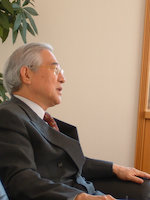 OGURA: From the Meiji period up to today, Japan has always looked to Europe and the United States. Our cultural exchange partners have more or less tended to be the Western countries. The fact that three of the Japan Foundation's largest cultural centers cluster in Europe is symbolic of the emphasis on the West, as is the fact that the Center for Global Partnership-- an organization that promotes collaboration between Japan and the United States--is much larger than the China Center.
OGURA: From the Meiji period up to today, Japan has always looked to Europe and the United States. Our cultural exchange partners have more or less tended to be the Western countries. The fact that three of the Japan Foundation's largest cultural centers cluster in Europe is symbolic of the emphasis on the West, as is the fact that the Center for Global Partnership-- an organization that promotes collaboration between Japan and the United States--is much larger than the China Center.
The recent economic success of East Asian countries has aroused much interest in Japan in the East Asia Community, and there are growing calls for stronger ties with Asian countries. Nevertheless, some unresolved issues still remain between Japan and our East Asian neighbors.
So we try to come up with programs that would help promote reconciliation, and inevitably most of them wind up being youth exchange projects. I think we should rise above that narrow mindset and learn to think more broadly about our relationship with Asia, such as how we can raise awareness of our Asian identity or consider what the role of Asia in the world should be.
ISHII: I agree. The work of the Confucius Institute can be described as the Chinese government's effort to export Chinese culture. The Korean Wave in Japan worked out well, on the other hand, because it emerged naturally from spontaneous exchanges between the Japanese and South Korean people, for example, Japanese female fans going wild over a South Korean actor's visit. It is also delightful to see the growing number of Japan-South Korea joint film projects.
OGURA: To name a few Japanese things that made their way into the world on their own, manga, sushi, fashion, and architecture come to mind.
ISHII: Yes, we could call that the Japanese Wave of sorts, as opposed to the Korean Wave.
OGURA: Recently, some people have pointed out that Japan's presence in the world has been diminishing while others believe our influence is growing, as shown by the spread of Japanese popular culture across the globe.
This latter view has led to the notion that the Japanese government should do more to promote our popular culture, which is sometimes referred to as the content industry or Japan's soft power. I am all for providing incentives and protecting intellectual property rights. But is it really a good idea for the state to get overly involved and try to use popular culture as leverage in international affairs when it is already thriving overseas without government support?
ISHII: No, I do not think it is. When it comes to cultural exchange, in particular, the government's involvement should be very delicate.
The urgent need to produce cultural exchange specialists or program officers
OGURA: What are your views on the training and development of cultural exchange specialists? The Japan Foundation is both a sponsor of various programs and a training institution that develops specialists.
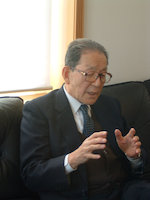 ISHII: The government's vertically structured bureaucracy means there is a rigid restriction on the terms used to describe the various types of cultural exchange activities. For instance, anything to do with the term "academic" is strictly a prerogative of the Ministry of Education, Culture, Sports, Science and Technology, and is off-limits to the Ministry of Foreign Affairs. Likewise, none of the exchange programs run by the Agency for Cultural Affairs can be called academic exchange. All those activities and programs, however, are to me all part of academic exchange and intellectual exchange in a broader sense. What we need is intellectual interactions based on a comprehensive perspective, not bound by those bureaucratic terminologies. Whether we can foster an environment that supports that kind of activity depends on efforts to fill the cracks between the vertically aligned government offices.
ISHII: The government's vertically structured bureaucracy means there is a rigid restriction on the terms used to describe the various types of cultural exchange activities. For instance, anything to do with the term "academic" is strictly a prerogative of the Ministry of Education, Culture, Sports, Science and Technology, and is off-limits to the Ministry of Foreign Affairs. Likewise, none of the exchange programs run by the Agency for Cultural Affairs can be called academic exchange. All those activities and programs, however, are to me all part of academic exchange and intellectual exchange in a broader sense. What we need is intellectual interactions based on a comprehensive perspective, not bound by those bureaucratic terminologies. Whether we can foster an environment that supports that kind of activity depends on efforts to fill the cracks between the vertically aligned government offices.
One thing the other countries' large institutions have that is lacking in the Japanese organizations is a position called program officer. The Japan Foundation is in need of one, too. A program officer is a professional who is outside of the organization's standard career track but provides substantive support to its operations. What is expected of a program officer is, for example, to study abroad not just to pick up language skills but to learn and bring back knowledge that he/she can contribute to cultural exchange work, such as awareness of the cultural gap between countries. The host organization should send a candidate to study abroad on the condition that he/she would work as its program officer upon return. The candidate should be required to submit a full report detailing his/her achievements at the end of the program. Typically in the United States, many of the professionals later teach at universities after having served as a program officer. These professionals are intellectuals who are also capable of functioning in an academic world.
OGURA: In fact, the Japan Foundation introduced the specialist job category two years ago. After working with us for a certain number of years, the people in this category would specialize in a particular department. They are placed on a separate career track from the regular staff, with a more competitive salary scheme. We have one or two specialists, who are generally in their 40s, working at all times within a specified field under such titles as the director or the advisor. The problem with creating such posts is that because these professionals are highly skilled there is a risk they would be headhunted by other organizations. To prevent that from happening, we need to place people with special knowledge on our senior management team and gradually change the way we manage our operations.
ISHII: Considering the investment you make in training them, the specialists should be required to work for you for a certain amount of time, say 10 or 15 years. You would also need to introduce an attractive wage scheme to retain them. On top of all that, the specialists/program officers must become respected figures within the organization.
Cultural exchange: Seemingly worthless but in fact a valuable activity
OGURA: During the Takeshita Administration (1987-1988) the government established three principles of diplomatic policy, in which it pledged to reinforce economic cooperation for peace, expand development assistance programs, and promote international cultural exchange. The third pillar of the policy, promoting cultural exchange, is now all but forgotten. It is the first thing that gets neglected when the economy slows down or the country turns inward.
ISHII: Yes, it is very sad to see that the new administration of the Democratic Party of Japan relegated cultural programs to secondary status in the recent jigyoshiwake budget screening process.
OGURA: On the other hand, couldn't we look at the situation like this--that what the government is doing is nothing other than the exercise of government power? An anti-authoritarian element is inherent in culture, so it must keep a certain distance from the government. Conversely, the government must not invade culture's territory. I sometimes get the sense that this very basic perspective is absent from the discussions at the budget screening hearings.
ISHII: Absolutely. The work that I have been doing for fifty years, for instance, is worthless from the standpoint of efficiency as defined by the budget review panelists, but I am convinced it has been very beneficial. Plato's philosophy would likewise be useless from their point of view, but in fact it is valuable. The same can be said of cultural exchange.
(The interview was held at the Japan Foundation office in Yotsuya, Tokyo on January 27, 2010)
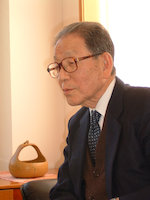 Yoneo Ishii
Yoneo Ishii
Born in Tokyo, Ishii became Doctor of Laws at Kyoto University. After serving at the Embassy of Japan in Thailand and the Asia and Oceania Affairs Bureau at the Ministry of Foreign Affairs, he worked at the Center for Southeast Asian Studies, Kyoto University, as a professor and the director. He has authored many books including Jozabu bukkyo no seijishakaigaku-kokkyo no kozo (The Sociology of Theravada Buddhism--Structure of National Religion), Tai kinseishi kenkyuu josetsu (Collected Papers on the Early Modern History of Siam), and Tai bukkyo nyumon (Introduction to Thai Buddhism). Ishii passed away in February 2010.
Related Events
Back Issues
- 2023.12. 7 Movie Theaters aroun…
- 2023.6.16 The 49th Japan Found…
- 2023.4.24 The 49th Japan Found…
- 2022.12.27 Living Together with…
- 2022.12.27 Living Together with…
- 2022.8.12 Inner Diversity <…
- 2022.3.31 The 48th Japan Found…
- 2022.3.29 Beyond Disasters - T…
- 2021.11.29 Crossing Borders, En…
- 2021.4.13 Crossing Borders, En…

